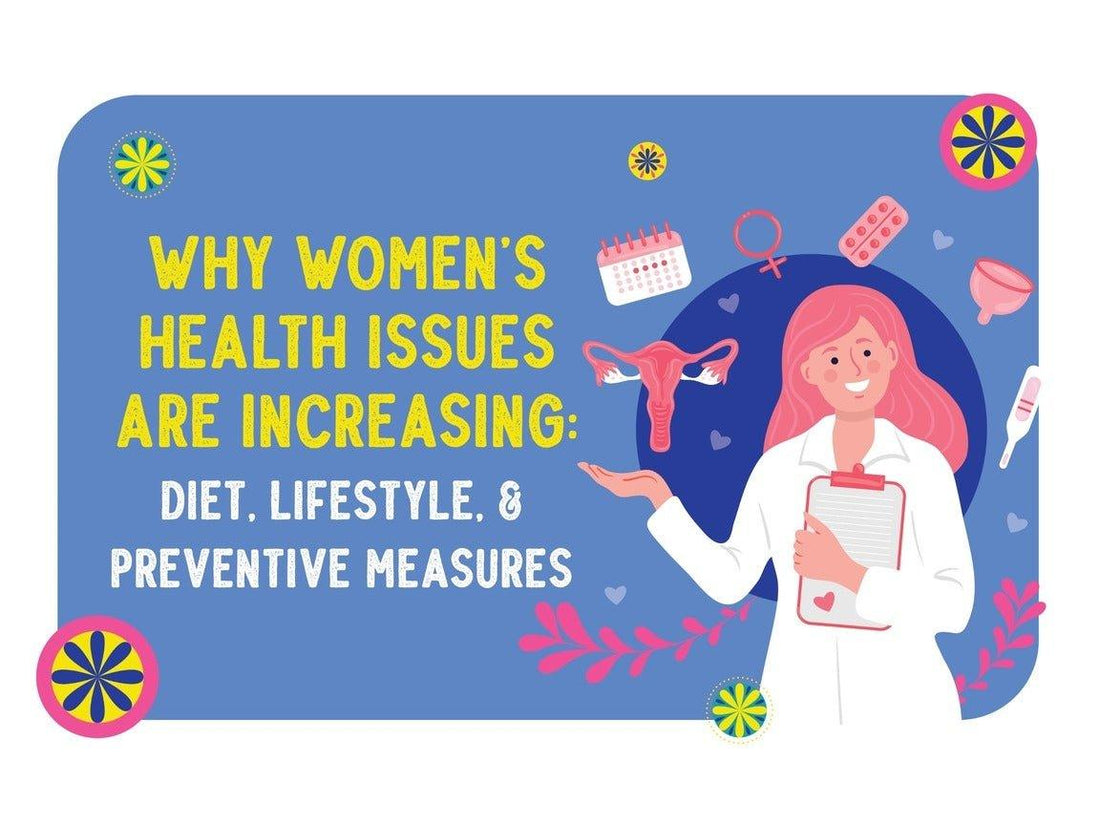Women face health challenges distinct from men due to physiological and hormonal differences. Understanding women’s health problems & solutions is essential for addressing the challenges effectively. In recent years, there's been a noticeable rise in health issues among women. From heart disease to mental health challenges, women are facing a myriad of health concerns. This alarming trend calls for a closer examination of the contributing factors. In this blog, we'll explore how diet, lifestyle choices, and preventive measures play a crucial role in this increase and what steps can be taken to improve women's health.
Why Do Health Issues Affect Women More Than Men?
Women experience hormonal fluctuations due to menstrual cycles, pregnancy, and menopause, making them more susceptible to conditions like PCOS, osteoporosis(bone issues), and hormonal imbalances. These physiological differences mean women are more likely to encounter particular health challenges. During these periods, women often face increased risks of developing chronic conditions and require tailored healthcare strategies to address these unique needs.
Why are health issues among women increasing nowadays?
- Processed Food Consumption: Modern diets are often high in processed foods, which lack essential nutrients like calcium and protein, contributing to bone health issues. Junk food consumption has increased, leading to inadequate intake of important vitamins and minerals necessary for maintaining good health.
- In-active Lifestyle: With the rise in sedentary (sitting) jobs and screen time, physical activity has decreased, negatively impacting overall health. Lack of exercise leads to weight gain, reduced bone density, and other health problems.
- Nutrient Deficiencies: Women often do not get enough essential nutrients like iron, calcium, and vitamin D, leading to anaemia, osteoporosis (bone issue) and weakened immune systems.
- Dieting Trends and Fads: From keto to intermittent fasting, many women experiment with extreme diets that can lead to nutritional imbalances and eating disorders.
Why Was the Previous Generation Less Affected?
Previously, diets were more natural and less processed, providing essential nutrients for bone and overall health. Women were more physically active, and lifestyles were less stressful compared to the present day. Traditional diets included fresh, whole foods rich in essential nutrients, which helped maintain good health and prevent many of the chronic diseases prevalent today.
Impact of Chronic Diseases on Daily Life
- Mental Pressure: Increased stress from work and social media contributes to anxiety and depression. Modern women face more mental pressure due to balancing career, family, and societal expectations, which affects their overall health. Additionally, the expectations set by social media to stay up to date and maintain certain standards contribute significantly to this pressure, leading to higher stress levels and impacting their well-being.
- Physical Health: Poor sleep patterns and unhealthy eating habits worsen health issues. The pressure to excel in various aspects of life often leads to late nights, poor diet choices, and insufficient exercise, all contributing to chronic health problems.
Diet and Lifestyle: The Role in Health Problems
- Poor Dietary Choices: Modern diets high in sugar and low in nutrients damage gut health, which is crucial for mental and physical health. Cravings for junk food, driven by dopamine, lead to poor dietary choices.
- Unhealthy Lifestyle Habits: Lack of sleep, unhealthy eating, and sedentary lifestyles worsen health issues like PCOS and PCOD. Women are now more likely to have irregular sleep patterns and higher stress levels, contributing to these conditions.
Smoking and Fertility
Smoking has been linked to decreased fertility, a significant issue for many women. It affects hormone levels, reduces egg quality, and increases the risk of miscarriages. Smoking can also lead to early menopause, reducing a woman's reproductive years and increasing the risk of developing other chronic conditions.
Comparison of Past and Present Health Issues

An overview of women's health issues

Lifestyle Changes
- Skin Problems: These are often worsened by chemical exposure and poor diet. The modern use of various beauty and skincare products containing harmful chemicals has increased skin-related issues.
- Mental Health: Overthinking and stress contribute to depression and anxiety. Mental health issues are increasingly recognized as significant health concerns, affecting overall quality of life.
- Cancer: Various types, including breast, ovarian, and cervical cancer, significantly impact women's health. Early detection through regular screenings and a healthy lifestyle are key to prevention and management.
Health Issues
- Diabetes: Affects metabolic health, increasing the risk of heart disease and other complications. Poor diet and sedentary lifestyle are major contributors to the rise in diabetes cases among women.
- Genetic Disorders: Hereditary conditions require careful management. Family history plays a significant role in the prevalence of certain chronic diseases, and understanding genetic risks can help in early detection and management.
Lack of Food
- Bone Health: Lack of calcium and poor nutrition lead to osteoporosis. Adequate calcium and vitamin D intake through diet and supplements is essential for maintaining bone health.
- Thyroid Issues: Linked to diet and lifestyle, affecting metabolism and overall health. Proper nutrition and regular check-ups are crucial for managing thyroid conditions.
Conscious Food Choices
Modern diets high in sugar and low in nutrients damage gut health, which is crucial for mental and physical health. Dopamine-driven cravings for junk food lead to poor dietary choices. Focusing on a balanced diet rich in whole foods, fruits, vegetables, lean proteins, and healthy fats can improve overall health and prevent chronic diseases. Incorporating nutritious snacks like nuts, roasted peanuts, and seasoned khakhras can provide a healthy alternative to junk food, supporting better gut health and overall well-being.
Preventive Measures to Improve Women’s Health
While the challenges are significant, there are effective strategies to combat these health issues:
- Balanced Diet: Emphasizing whole foods, including fruits and vegetables, while reducing processed food intake and ensuring adequate nutrient consumption, can significantly improve health outcomes. Incorporating healthy snacks like peanuts, nuts, chana and khakhras can provide nutritious and convenient options during work hours. These snacks offer a balance of protein, fiber, and healthy fats, making them ideal for maintaining energy levels and supporting overall health throughout the day. Prioritizing these healthy food choices can enhance both physical and mental well-being.
- Regular Exercise and Stress Management: Incorporating small exercises into daily routines can significantly impact women's health. Simple activities like walking after lunch, climbing stairs, and doing light stretching throughout the day can improve cardiovascular health, boost metabolism, and reduce stress. These minor adjustments promote overall well-being and a more active lifestyle. Managing stress through mindfulness, meditation, and yoga enhances well-being. Addressing social media and peer pressure by taking breaks, setting boundaries, and focusing on real-life interactions can mitigate stress. Seeking support from friends, family, or mental health professionals is essential for mental health. Combining physical activity with stress management leads to a balanced life.
- Healthy Sleep Habits and Routine Health Check-Ups: Prioritizing healthy sleep habits and routine health check-ups is essential for women's well-being. To ensure quality sleep, maintain a regular sleep schedule, create a restful environment, and avoid stimulants like caffeine before bedtime. Additionally, Women should stay updated with regular health check-ups for early detection of issues. Recommended tests include those for breast cancer, cervical cancer, and other health conditions to maintain optimal health.
Remember, staying healthy doesn't have to be boring—find joy in the journey and celebrate every step towards a healthier you!























































